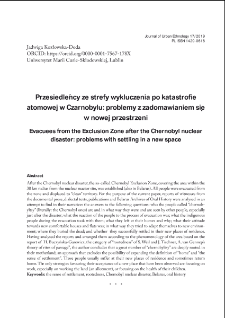
Obiekt
Tytuł: Przesiedleńcy ze strefy wykluczenia po katastrofie atomowej w Czarnobylu: problemy z zadomawianiem się w nowej przestrzeni
Inny tytuł:
Evacuees from the Exclusion Zone after the Chernobyl nuclear disaster: problems with settling in a new space ; Journal of Urban Ethnology 17 (2019)
Wydawca:
Instytut Archeologii i Etnologii PAN
Miejsce wydania:
Opis:
Typ obiektu:
Abstrakt:
After the Chernobyl nuclear disaster, the so-called Chernobyl Exclusion Zone, covering the area within the 30 km radius from the nuclear reactor site, was established (also in Belarus). All people were evacuated from the zone and displaced to “clean” territory. For the purpose of the current paper, reports of witnesses from the documental prose, dialectal texts, publications and Belarus Archives of Oral History were analysed in an attempt to find in their narratives the answers to the following questions: who the people called “chernobyltsy” (literally: the Chernobyl ones) are and in what way they were and are seen by other people, especially just after the disaster; what the reaction of the people to the process of evacuation was; what the indigenous people during the evacuation took with them; what they left at their homes and why; what their attitude towards new comfortable houses and flats was; in what way they tried to adapt themselves to new environment; where they buried the dead; and whether they successfully settled in their new places of residence. Having analysed the reports and arranged them according to the phenomenology of the area based on the report of H. Buczyńska-Garewicz, the category of “rootedness” of S. Weil and J. Tischner, A. van Gennep’s theory of rites of passage”, the author concludes that a great number of “chernobyltsy” are deeply rooted in their motherland; an approach that excludes the possibility of expanding the definition of “home” and “the sense of settlement”. Those people usually suffer at their new places of residence and sometimes return home. The only strategies favouring their acceptance of a new place that have been observed are focusing on work, especially on working the land (an allotment), or focusing on the health of their children
Czasopismo/Seria/cykl:
Tom:
Strona pocz.:
Strona końc.:
Szczegółowy typ zasobu:
Format:
Identyfikator zasobu:
oai:rcin.org.pl:113601 ; 1429-0618
Źródło:
IAiE PAN, call no. P 714 ; IAiE PAN, call no. P 1505 ; kliknij tutaj, żeby przejść
Język:
Prawa:
Zasady wykorzystania:
Copyright-protected material. May be used within the limits of statutory user freedoms
Digitalizacja:
Institute of Archaeology and Ethnology of the Polish Academy of Sciences
Lokalizacja oryginału:
Library of the Institute of Archaeology and Ethnology of the Polish Academy of Sciences
Dostęp:
Kolekcje, do których przypisany jest obiekt:
- Repozytorium Cyfrowe Instytutów Naukowych > Kolekcje Partnerów > Instytut Archeologii i Etnologii PAN > Publikacje Pracowników i Wydawnictwa IAE PAN
- Repozytorium Cyfrowe Instytutów Naukowych > Kolekcje Partnerów > Instytut Archeologii i Etnologii PAN > Publikacje Pracowników i Wydawnictwa IAE PAN > Czasopisma bieżące
- Repozytorium Cyfrowe Instytutów Naukowych > Piśmiennictwo > Czasopisma/Artykuły
- Repozytorium Cyfrowe Instytutów Naukowych > Kolekcje Partnerów > Instytut Archeologii i Etnologii PAN > Publikacje Pracowników i Wydawnictwa IAE PAN > Czasopisma bieżące > Journal of Urban Ethnology
Data ostatniej modyfikacji:
11 kwi 2021
Data dodania obiektu:
17 lut 2020
Liczba pobrań / odtworzeń:
1158
Wszystkie dostępne wersje tego obiektu:
https://rcin.org.pl./publication/141970
Wyświetl opis w formacie RDF:
Wyświetl opis w formacie RDFa:
Wyświetl opis w formacie OAI-PMH:
Obiekty Podobne
Dworaczek, Kamil (1985– )
Sidorovich, V. E.
Bartosiak, Monika
Kabzińska, Iwona

 INSTYTUT ARCHEOLOGII I ETNOLOGII POLSKIEJ AKADEMII NAUK
INSTYTUT ARCHEOLOGII I ETNOLOGII POLSKIEJ AKADEMII NAUK
 INSTYTUT BADAŃ LITERACKICH POLSKIEJ AKADEMII NAUK
INSTYTUT BADAŃ LITERACKICH POLSKIEJ AKADEMII NAUK
 INSTYTUT BADAWCZY LEŚNICTWA
INSTYTUT BADAWCZY LEŚNICTWA
 INSTYTUT BIOLOGII DOŚWIADCZALNEJ IM. MARCELEGO NENCKIEGO POLSKIEJ AKADEMII NAUK
INSTYTUT BIOLOGII DOŚWIADCZALNEJ IM. MARCELEGO NENCKIEGO POLSKIEJ AKADEMII NAUK
 INSTYTUT BIOLOGII SSAKÓW POLSKIEJ AKADEMII NAUK
INSTYTUT BIOLOGII SSAKÓW POLSKIEJ AKADEMII NAUK
 INSTYTUT CHEMII FIZYCZNEJ PAN
INSTYTUT CHEMII FIZYCZNEJ PAN
 INSTYTUT CHEMII ORGANICZNEJ PAN
INSTYTUT CHEMII ORGANICZNEJ PAN
 INSTYTUT FILOZOFII I SOCJOLOGII PAN
INSTYTUT FILOZOFII I SOCJOLOGII PAN
 INSTYTUT GEOGRAFII I PRZESTRZENNEGO ZAGOSPODAROWANIA PAN
INSTYTUT GEOGRAFII I PRZESTRZENNEGO ZAGOSPODAROWANIA PAN
 INSTYTUT HISTORII im. TADEUSZA MANTEUFFLA POLSKIEJ AKADEMII NAUK
INSTYTUT HISTORII im. TADEUSZA MANTEUFFLA POLSKIEJ AKADEMII NAUK
 INSTYTUT JĘZYKA POLSKIEGO POLSKIEJ AKADEMII NAUK
INSTYTUT JĘZYKA POLSKIEGO POLSKIEJ AKADEMII NAUK
 INSTYTUT MATEMATYCZNY PAN
INSTYTUT MATEMATYCZNY PAN
 INSTYTUT MEDYCYNY DOŚWIADCZALNEJ I KLINICZNEJ IM.MIROSŁAWA MOSSAKOWSKIEGO POLSKIEJ AKADEMII NAUK
INSTYTUT MEDYCYNY DOŚWIADCZALNEJ I KLINICZNEJ IM.MIROSŁAWA MOSSAKOWSKIEGO POLSKIEJ AKADEMII NAUK
 INSTYTUT PODSTAWOWYCH PROBLEMÓW TECHNIKI PAN
INSTYTUT PODSTAWOWYCH PROBLEMÓW TECHNIKI PAN
 INSTYTUT SLAWISTYKI PAN
INSTYTUT SLAWISTYKI PAN
 SIEĆ BADAWCZA ŁUKASIEWICZ - INSTYTUT TECHNOLOGII MATERIAŁÓW ELEKTRONICZNYCH
SIEĆ BADAWCZA ŁUKASIEWICZ - INSTYTUT TECHNOLOGII MATERIAŁÓW ELEKTRONICZNYCH
 MUZEUM I INSTYTUT ZOOLOGII POLSKIEJ AKADEMII NAUK
MUZEUM I INSTYTUT ZOOLOGII POLSKIEJ AKADEMII NAUK
 INSTYTUT BADAŃ SYSTEMOWYCH PAN
INSTYTUT BADAŃ SYSTEMOWYCH PAN
 INSTYTUT BOTANIKI IM. WŁADYSŁAWA SZAFERA POLSKIEJ AKADEMII NAUK
INSTYTUT BOTANIKI IM. WŁADYSŁAWA SZAFERA POLSKIEJ AKADEMII NAUK


































